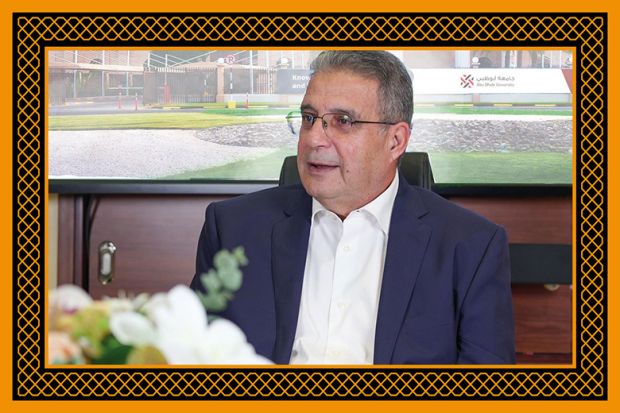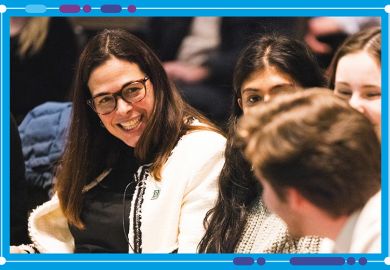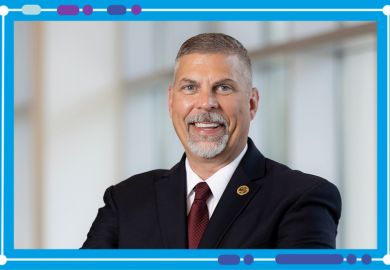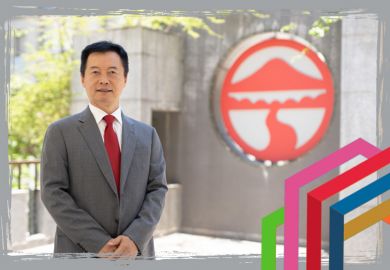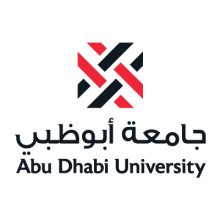Browse the full results of the Arab University Rankings 2024
Ghassan Aouad believes a university degree is important – but perhaps not as important as one would expect given that he is a university leader.
“The degree is maybe 30 per cent of what can open doors for you for a job,” the chancellor of Abu Dhabi University says.
Emotional intelligence, charisma and leadership skills are among what make up the other 70 per cent, and these need to be taught more in universities and schools, he believes.
“Why don’t we teach them leadership, research skills, statistics, innovation, sustainability at the age of 10. Why not?” he says. “Why don’t we tell them that they have to be charismatic as kids?”
Aouad is interested in different types of intelligence and says he has identified 21 kinds through his research. In the past, IQ was the main measure, he says, but “now successful people have a combination of emotional intelligence, cultural intelligence, social intelligence, digital intelligence, media intelligence, charisma intelligence”.
Born in Lebanon, Aouad became a civil engineer and built schools before moving to the UK to study for a master’s and a PhD at Loughborough University. He became a research fellow at the University of Salford and climbed the ranks to pro vice-chancellor for research. He then returned to the Middle East and held leadership roles in the United Arab Emirates, Kuwait and Bahrain, before moving to Abu Dhabi just under two years ago.
One skill that he says he has picked up from his travels is cultural intelligence. “I took what’s good from every single culture, in fact. So when I was in the UK, I managed to get the best of the UK culture. And, of course, I brought my own value system, and people respected you for that, because you are integrated and not isolated at all.”
Having spent time in Eastern and Western universities, Aouad has no time for the criticism aimed at universities from some quarters of the population in the UK and the US. It doesn’t help society to attack universities “when universities are producing the future of any nation”, he says.
Given that mental health problems are extremely common among the current generation of students, who experienced the pandemic in their formative years, the focus should be on supporting them to get a degree and be healthy, Aouad believes, not on challenging universities. In the UAE, it’s “the opposite”. Universities enjoy the full support of the country’s leaders, he says.
Aouad’s view is that the debate around freedom of speech is also a distraction.
“This ‘freedom of expression’ and the rest…I was in the West for 25 years…what does it mean? Freedom of expression to go and express your views and insult somebody? I don’t think it’s right at all,” he says.
Campus resource collection: Higher education’s role in upholding democracy
“The debate should be about how to get the funding, how to get the research, how to get the business moving.”
Abu Dhabi University is private and financially stable, but public universities in the UAE are not strapped for cash, either. He believes the funding issues facing UK universities will impact the future of the sector.
“I was there during the golden years, when the universities were doing really well. Everybody wanted a British education.” Now, he thinks, the landscape is changing. As Western universities stagnate and those in the Middle East and elsewhere improve, “the picture will be very different in 20 years”.
Would he take a vice-chancellor job at a UK university now? “I’m extremely happy. This is a fascinating job. If I wasn’t at Abu Dhabi, maybe I would.” In the 1990s, when he was a pro vice-chancellor in the UK, he thinks he would have struggled to get a top job as an ethnic minority in Britain. “Now I think things have changed,” he says.
While Aouad has no time for those criticising universities, he does have some sympathy for the notion that certain courses don’t set students up for employability. “When I was in Salford we had a degree in music, and it was so popular, and many people were not finding a job.”
When it comes to the arts, he recognises that the Middle East and Asia are not as strong as Europe or the US. Abu Dhabi University does offer courses such as mass communication, digital marketing and interior design, he says, but cultural differences mean less focus on the arts.
“When I was a child, there were three jobs I could do: engineer, medical doctor, lawyer,” he says. “Maybe in the West students choose their own discipline; in the East, in general, people are influenced by their parents and relatives.”
rosa.ellis@timeshighereducation.com
This is part of our “Talking leadership” series with the people running the world’s top universities about how they solve common strategic issues and implement change. Follow the series here.
Register to continue
Why register?
- Registration is free and only takes a moment
- Once registered, you can read 3 articles a month
- Sign up for our newsletter
Subscribe
Or subscribe for unlimited access to:
- Unlimited access to news, views, insights & reviews
- Digital editions
- Digital access to THE’s university and college rankings analysis
Already registered or a current subscriber?
